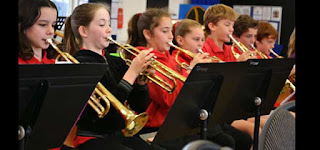I was educated in Canberra from the mid 1980s...
 |
| Source: Torrens Primary School Band retrieved from www.torrensps.act.edu.au |
Reflecting on my own primary school education I have realised that while
creative arts may not have had the same importance placed on them as numeracy
and literacy, they were considered more than just a rainy day activity. We had
an active school band and a role could be found for anyone who was interested.
Whole school productions were regularly organised and participation was
encouraged. I also remember being given opportunities to try new things - I
have a vivid memory of using a computer to create designs that could be printed,
it was modern and amazing!
It was in secondary school that creative arts became more of a personal
choice, though importantly we had several options to choose from. There were
the usual electives of music and drama, and we also had the gender stereotyped
electives of woodwork, metalwork, and humanities. I was a bit of a rebel, I chose
technical design and loved it!
Whilst creative arts may not have been integrated across the curriculum,
they were available, students were encouraged to try different things, and most
importantly they were considered part of a good education. I still remember
students’ achievements in those classes being publically celebrated. For me,
experiences in creative arts is an expectation I have of education.
John O'Toole (2012) comments that play and art are natural motivators.
This idea resonates with me when I think about the enthusiasm I felt for
participating in these classes compared with my dry and at times confusing
maths class. I am now trying to imagine how our education experiences may have
varied if the creatives arts had been integrated with some of the more
polarising, challenging, albeit important, curriculum topics... perhaps I
wouldn't have struggled with maths?!
References:
O'Toole, J. (2012). Art, creativity and motivation. In C. Sinclair, N. Jeannert & J. O'Toole (Eds), Education in the arts. Melbourne, Vic: Oxford University Press.
No comments:
Post a Comment